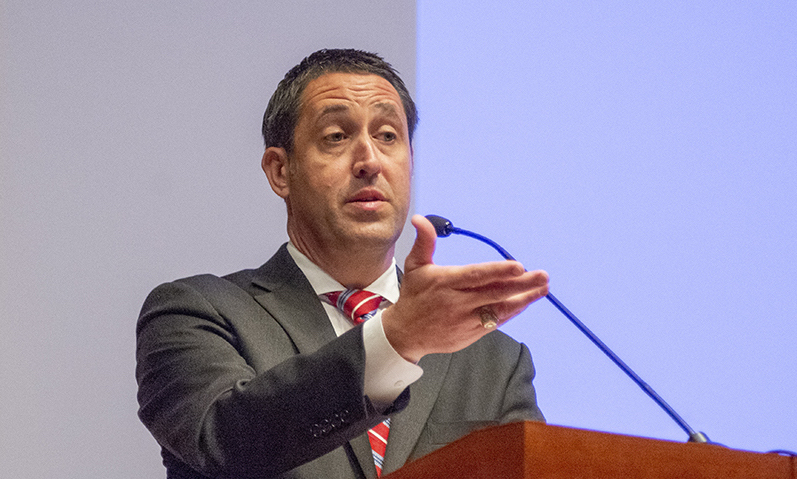The City of Round Rock could lose $30 million or more in yearly sales tax revenue under a proposed rule change affecting how state and local governments collect tax from online retailers like Dell Technologies, which is headquartered in Round Rock.
City Attorney Steve Sheets testified Wednesday at the Legislature in opposition to the rule change, which is proposed by the state Comptroller. The new rule says that remote sellers “should collect local use tax based on the destination location” – not based on where a company’s sales office or headquarters is located.
In effect, this would shift millions in sales tax revenue away from Round Rock to other cities.
Round Rock City Attorney Steve Sheets told the Texas House of Representatives’ Ways and Means Committee on Wednesday, “Frankly, if these rules as proposed are adopted by the Comptroller, they will absolutely devastate the financial stability of the city of Round Rock.”
“Round Rock will lose at least $30 million annually in sales tax revenues. And we’ll be forced to increase property taxes to make up the difference.”
In fiscal year 2019, Round Rock collected a total of $28.5 million in sales tax from Dell sales, about a quarter of which went to property tax relief.
Sheets warned that the city’s limited ability to hike property taxes, coupled with the hit on sales tax revenues, could affect the city’s bond rating.
He said, “The city’s current bond rating is triple A, which compares to the state of Texas bond rating of triple A. The sheer magnitude of the projected loss of sales tax revenues will almost certainly result in a downgrade of the city’s bond rating, which will also result in the taxpayers of Round Rock having to pay millions of dollars of additional interest on future bond issues.”
Representative Jim Murphy (R-Houston) questioned Sheets about how much the city would have to raise its property tax rate in order to make up for the loss of sales tax revenue. Sheets responded, “The rate would need to go up 13.3 cents.” That’s a 30% increase from the current level of 43.9 cents per $100 valuation.
Tough Crowd
Round Rock has a 60-year economic development agreement with Dell that doesn’t expire until 2053. Under the deal, Dell gets rebates of about $10 million per year on its sales taxes. Those rebates could go away if Dell has to pay sales taxes elsewhere rather than in Round Rock.
City leaders worry that that would undermine the incentive that Dell has to remain in Round Rock rather than shifting operations elsewhere.
But Comptroller Glenn Hegar, Chairman Dustin Burrows (R-Lubbock), Rep. Drew Springer (R-Muenster), and some other members of the House Ways and Means Committee aren’t all that sympathetic.
They point out that the rule doesn’t take effect until the end of 2022 for sellers like Dell that have entered an economic development agreement with a local government, which gives cities time to figure out a Plan B.
They also believe that the rule change is necessary to stop the bleed in rural communities and small towns, which are losing tax dollars as online retailers capture a larger share of retail markets. These internet retailers have been paying sales taxes to out-of-state cities or tech hubs like Round Rock, rather than paying them locally.
Rep. Drew Springer said, “I would argue that generational poverty in rural Texas is immensely worse and it continues to get worse as we see brick-and-mortars go away and more and more of this online proliferation.”
He continued, “Two-day shipment to rural Texas ain’t a bad deal. And we get that, we understand that. But I think when most Texans see that they’re charged that local sales tax, they think that that comes back to their local community and will help reduce their property taxes or provide their services that are needed.”

A handful of big cities “are making out like bandits on this deal” while others are harmed, Springer said. The small towns in his district, for example, are losing tax dollars “to send to the bottom line of a corporation with some side benefits to these 10 municipalities.”
Rep. Burrows said that the rule change would rebalance this: “We’re re-shifting money within Texas, for the most part. Some cities in Texas are getting more and others are getting less.”
Rep. Springer also argued that economic incentive agreements of the kind between Round Rock and Dell put small businesses at a disadvantage, giving large corporate competitors an unfair, privileged tax status.
“I am not aware of any mom-and-pop operation that’s been given a Section 380 agreement type of deal, which also helps drive the ‘ma and pas’ out of business – because they don’t get that extra 2% to the bottom line or 1.25% to the bottom line that the big guys get,” he said.
The rule governing remote sellers applies only to businesses doing $500,000 or more in remote sales in the state yearly.
Rep. James Talarico, the freshman Democrat who represents Round Rock, spoke out in defense of the existing tax system, criticizing the rule change as “rushed” and undemocratic. He wants the Legislature to vote on the matter in 2021, rather than allowing the Comptroller’s office to set the rule of its own accord.
“The 12,000 Dell employees that live in our little town of Round Rock commute to work every day on our roads and use other local services,” Talarico reasoned.
For this reason, he said, the tax dollars should stay in Round Rock. “Everyone wants to ride the wagon, no one wants to pull it. Round Rock is pulling the wagon on this one.”
The Comptroller’s rule-making authority on the issue stems from two laws passed last session, HB 1525 and HB 2153. These bills paved the way for Texas to tax online retailers, including those based out-of-state. That had not been possible before a U.S. Supreme Court decision in 2018 that overturned earlier precedent.
Rep. Burrows, the chairman of the Ways and Means Committee, was the author of both of those bills. He has emerged in the Legislature as a critic of local governments, whom he sees as overreaching at the expense of taxpayers.
